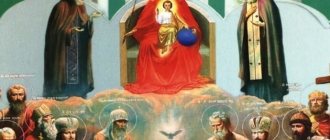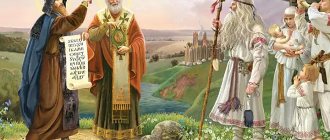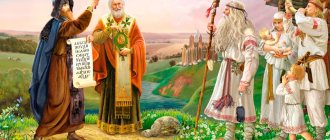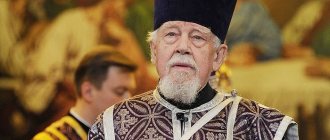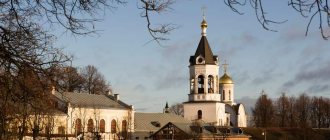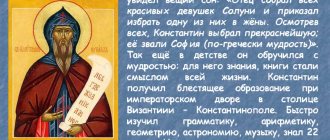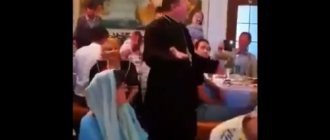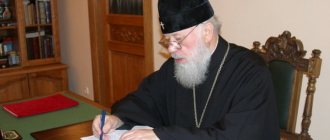| Archim. Kirill (Pavlov) |
Kirill (Pavlov)
(1919 - 2017), archimandrite, fraternal confessor of the Trinity-Sergius Lavra In the world, Ivan Dmitrievich Pavlov, was born on October 8, 1919 in the village of Makovskie Vyselki, now the Mikhailovsky district of the Ryazan region.
Born and raised in a believing peasant family. According to him, “ from the age of 12 he lived in an unbelieving environment, with his brother, and lost his spirituality
.”
After graduating from college, he worked as a technologist at a metallurgical plant. He was drafted into the army in the late 1930s and served in the Far East. Also participated in the Finnish campaign [1]. Served in the infantry.
A return to spirituality occurred during the Great Patriotic War. From the very beginning of the war he participated in the hostilities as an infantry sergeant. The most difficult military test for him was waiting for the general Battle of Stalingrad in a trench, in the snow, almost without water and food under constant enemy fire for a whole month. With the rank of lieutenant and as a platoon commander, he took part in the Battle of Stalingrad.
Sometimes Fr. Kirill is mistakenly identified with another Pavlov, Yakov Fedotovich, the famous sergeant who defended the legendary Stalingrad “Pavlov’s House”. Ya.F. Pavlov was at party work after the war [2].
Father Kirill later said:
«
The Great and Terrible Patriotic War was allowed by the Lord himself, who, not wanting anyone to die, burns everyone in this crucible, cleansing the corrupt people who have lost their faith in order to save those who can be saved... And when they began to open churches, such was the upsurge among the people. People went to churches. After the Battle of Stalingrad, when we arrived in the Tambov forests to rest, one Sunday I went to Tambov. The only temple was opened there. The cathedral was all bare, just walls... Crowded with people. I was in military uniform, in an overcoat. The priest, Father John, who later became Bishop Innokenty of Kalinin, delivered such a heartfelt sermon that everyone in the church cried bitterly. It was a continuous cry...
«
After the liberation of Stalingrad, an event occurred that finally changed his life. At the beginning of April 1943, while on guard duty, among the ruins of a house, he picked up a book from the trash. It turned out to be the Gospel... “I walked with the Gospel and was not afraid...,
- the priest later recalled.
“ The Lord was just next to me, and I was not afraid of anything
.”
Participated in battles near Lake Balaton in Hungary. With his part he reached Austria.
In 1946, he was demobilized in Hungary and came to Moscow.
“In the Yelokhovsky Cathedral I ask if we have any spiritual institution. “There is,” they say, “a theological seminary has been opened in the Novodevichy Convent.” I went there straight in military uniform. I remember the vice-rector, Father Sergius Savinsky, greeted me cordially..."
After completing the seminary, he studied at the Moscow Theological Academy, by that time already within the walls of the Trinity-Sergius Lavra.
On August 25, 1954 [3] he took monastic vows at the Lavra with the name Kirill [4].
That same year he graduated from the Moscow Theological Academy and was ordained on October 8 as a hierodeacon [5], and then as a hieromonk.
At first he was a sexton (1954), and in 1970 he was appointed treasurer of the Lavra. Since 1965 he has also been a fraternal confessor. He was elevated to the rank of archimandrite. Over time, his clergy became significant far beyond the confines of the monastery, many people were drawn to him, starting from ordinary laymen, and the “All-Russian confessor” ascetically did not refuse to receive anyone. At the same time, he was the confessor of three patriarchs of Moscow and All Rus' - Alexy I, Pimen, and Alexy II. Over time, the patriarch transferred him to his residence in Peredelkino, where Father Kirill continued to receive many of his spiritual children. He loved to give everyone chocolate, a church calendar, or small icons. He wrote a lot in the epistolary genre: annually he sent up to 5,000 letters with congratulations, instructions and edifications to bishops, priests, laity, spiritual children and even unfamiliar people.
Around 2003, the elder suffered a stroke, which first immobilized him and then practically deprived him of the opportunity to communicate with the outside world. Bedridden, courageously enduring his illness, he did not seek support and consolation, but in brief moments, when his strength returned to him, he himself supported and consoled those around him.
Warned about the dangers of introducing a tax identification number. The statements of Father Kirill (Pavlov) about the assignment of a TIN were never broadcast, but were always kept in the spirit of spiritual sobriety and humility characteristic of the elder. O. Kirill emphasized the spiritual danger of those processes of globalization, one of the elements of which is tax identification number, the creation of a “common market”, computerization, etc. At the same time, Father Kirill called for vigilance and attention to one’s soul, since renunciation of Christ, as he emphasizes, can begin unnoticed, in the routine of everyday and habitual sins, which a person himself is inclined to consider small and insignificant. The INN and everything connected with it is “the beginning of the end,” as Father Kirill says, but opposition to violent innovations must be reasonable and careful, since one should be afraid not only of the INN, but also of church schism, preventing which is a sacred duty and calling hierarchy and clergy [6].
He died on February 20, 2022 at the age of 98, after a long illness. The funeral service was led by Patriarch Kirill of Moscow and All Rus' with a large host of hierarchs, clergy, residents of the Trinity-Sergius Lavra, teachers and students of the Moscow Theological Academy, and ordinary believers. He was buried on the territory of the Lavra behind the altar of the Church of the Holy Spirit [7].
| Archim. Kirill (Pavlov) |
Biography
Kirill (Ivan) Pavlov – archimandrite, confessor of Patriarch Alexy II and the Trinity-Sergius Lavra. The elder is revered by the Russian Orthodox Church and society.
Kirill Pavlov in 2017
In the fall of 1919, Ivan Dmitrievich Pavlov was born. The man is now known as Archimandrite Kirill. The clergyman's parents came from peasants. The Pavlovs lived in the small village of Makovskie Vyselki, located on the territory of the Ryazan province. From childhood, the young man was instilled with a love of faith and of God.
At the age of 12, his parents decided to send the boy to the city of Kasimov to complete his education. The thing is that in the village where the Pavlovs lived there was no seven-year school. His brother, who spoke negatively about religion, also went with Ivan Dmitrievich. Atheism in those years spread among residents of large cities.
Portrait of Kirill Pavlov
In 1934, Ivan Pavlov entered the Kasimovsky Industrial College. After receiving his diploma, in 1938 the young man was hired to work at a metallurgical plant located in the city of Katav-Ivanovsk. But I didn’t manage to work at the company for long. Ivan Dmitrievich was drafted into the army.
The village boy was sent to the Far East. Army service turned out to be difficult for Pavlov. The young man went through the Great Patriotic War, defended Stalingrad as a platoon commander, and fought near the Hungarian Lake Balaton. I celebrated victory in Austria. Documents confirming the lieutenant's demobilization arrived in 1946.
Kirill Pavlov
The biography of Ivan (Kirill) Pavlov should be divided into two stages: before and after the war. During hostilities, the young man returned to faith again. Upon returning home, the guy took monastic vows. Pavlov did not forget about the family. Every year he came to his relatives in the village, and later to the village of Makovo, where his parents, sisters and brother were buried.
“One day, among the ruins, I picked up a book from the trash.”
In the winter of 1942-1943, for almost two months the soldiers of the 254th Tank Brigade lay on the defensive in snowy trenches and trenches. Father Kirill recalled: “Two meters of snow. They dug in only a meter deep and were freezing, wrapped in greatcoats, and even trophy German ones. Food was delivered only at night, cold and frozen. How did you survive?.. By a miracle of God!”
The combat description of the Red Army soldier Pavlov talks about his feat near the village of Tsybenko (he was a mine carrier and “timely provided a crew that destroyed up to 90 enemy soldiers and officers, 3 German mortars, 4 machine gunners”). On February 6, 1943, for his military merits, he was even accepted as a candidate member of the CPSU (b) (this is evidenced by his personal file, discovered in the summer of 2019 in the Central Asia of the Ministry of Defense in Podolsk).
Personal file on the admission of Red Army soldier Ivan Pavlov to the party in February 1943
“I couldn’t get away, defend myself, find motivation... They identified us as five people - they say, they won at Stalingrad, young, disciplined - the political instructor vouched for it, wrote a petition...” Father Kirill said about this episode of his military biography.
He himself could not forget something else - the strange and terrible silence and corpse smell, which made the liberated Stalingrad a truly dead city, instilling horror before death.
“It was April, the sun was already warm,” Father Kirill recalled in one of his television interviews (these footage was included in the documentary “The Stalingrad Gospel of Ivan Pavlov”).
«One day, among the ruins of a house, I picked up a book from the trash. I began to read it and felt something so dear to my soul. This was the Gospel! I found such a treasure for myself, such a consolation! I collected all the leaves together - the book was broken, and that Gospel remained with me all the time. Before this there was such confusion: why is there a war, why are we fighting? There were a lot of incomprehensible things, because there was complete atheism in the country, lies, you wouldn’t know the truth. And when I started reading the Gospel, my eyes just opened up to everything around me, to all the events.”
Monasticism and service
Father Kirill went to the seminary immediately after the army. Arriving in Moscow, the man asked the servants of the Elokhovsky Cathedral where the religious institution was located. It turned out that the nearest object was in the Novodevichy Convent.
Kirill Pavlov in his youth
In military uniform, Kirill Pavlov went to the seminary. Father Sergei Savinskikh received the new minister with open arms and offered to study the test program. Having completed his studies at the Moscow Theological Seminary, he began his studies at the Moscow Theological Academy. According to official data, the archimandrite graduated in 1954.
In August of the same year, he took monastic vows at the Trinity-Sergius Lavra. He served as a sexton. After 16 years, he was appointed to the position of treasurer. And in 1965 he became the confessor of the monastic brethren. At the same time, Kirill Pavlov was elevated to the rank of archimandrite.
Patriarchate
Metropolitan Kirill came to the patriarchal throne thanks to his active social and political position. Since 1995, he has carried out fruitful work with the government of the Russian Federation and widely covered spiritual and educational issues on television during sermons in the “Word of the Shepherd” program. Then he managed to create the concept of the Russian Orthodox Church in the field of church-state relations, and already in 2000 the Fundamentals of the Social Concept of the Russian Orthodox Church were adopted.
In 2008, after the death of Alexy II, Metropolitan Kirill became locum tenens of the patriarchal throne. In 2009, in a local vote, he was elected Patriarch of Moscow and All Rus', gaining 507 votes and 677 possible.
Metropolitan Kirill's enthronement took place on February 1, 2009. The ceremony was attended by top officials of the country's political elite: then-Russian President Dmitry Medvedev and his wife Svetlana Vladimirovna, Russian Prime Minister Vladimir Putin, the wife of the country's ex-president Naina Yeltsin and the head of Moldova Vladimir Voronin. The Russian leadership then expressed hope for further cooperation between the Russian Orthodox Church and the state.
Patriarch Kirill bears the patriarchal cross to this day. He regularly makes visits abroad, where he is considered a person of fundamental knowledge, broad erudition and high intelligence. The meetings of the high priest with Western religious and secular leaders significantly strengthened the position of the Russian Orthodox Church and expanded the boundaries of cooperation between Russia and foreign countries.
View this post on Instagram
A post shared by His Holiness Patriarch Kirill (@patriarchkirill)
Patriarch Kirill and Vladimir Putin
Over decades of serving the Church, His Holiness has developed a strict schedule, which others compare to constant time pressure. Patriarch Kirill has no days off. Even on Sunday, when it is impossible to work according to the requirements of the canons, he performs divine services, in extreme cases, if necessary, holds meetings, reviews documents, and prepares public speeches.
The Primate of the Russian Orthodox Church did not ignore the situation with autocephaly in Ukraine. The “Unification Council” in Kyiv, according to the bishop, is an anti-canonical, illegal meeting, the decisions of which cannot have force on Ukrainian soil.
Unfortunately, as Forbes noted, Patriarch Kirill does not have the leverage that can change the current state of affairs. And the rupture of Eucharistic communion for political reasons looks like a protest
“against the upcoming redistribution of territories, churches and flocks, as a result of which the Moscow Patriarchate may lose from a quarter to a third of the total number of its parishes. This will lead to the collapse of the important myth of the “indestructible and indivisible Russian Church.”
Everything that a person strives for - power, wealth, social position - in no way shapes the inner...
Posted by Patriarch Kirill on Sunday, August 22, 2021
Patriarch Kirill
In 2022, the media published news that the high priest was awarded the title of honorary professor of the Russian Academy of Sciences “as a man of faith who speaks the same language with the secular scientific community.” Later, the Russian Academy of Sciences issued a refutation and apologized to His Holiness.
In March of the same year, the patriarch visited the Sretensky Monastery in Moscow, where Compline took place with the reading of the Great Penitential Canon of Andrew of Crete. A delegation of the Greek Orthodox Church was present at the service. As a gift to the monastery library and students of the Sretensky Theological Seminary, His Holiness Patriarch Kirill donated a collection of his sermons “Be zealous for spiritual gifts. About prayerful work and spiritual growth."
The situation in the world with the spread of coronavirus could not but affect the leadership of the Russian Orthodox Church. Measures were introduced in churches to curb the spread of the disease; Patriarch Kirill gave his blessing to a special prayer, which began to be read in every parish during the service. Nevertheless, in his speeches the hierarch stated that it is impossible to become infected with the virus from the holy gifts.
The high priest also voiced the church’s opinion on vaccination. By his example, he showed that it is necessary to stabilize the situation. The hierarch was vaccinated in March 2022.
Confessor of the Patriarch
Soon Kirill Pavlov was forced to move to Peredelkino. Such changes in the life of the archimandrite occurred due to the appointment of Patriarch Alexy II to the position of confessor. Despite this, the elder visited the monastery for spiritual instructions to the monks.
Kirill Pavlov in the Trinity-Sergius Lavra
The confessor was awarded the orders of St. Prince Vladimir and St. Sergius of Radonezh. Pavlov preferred to write sermons and teachings in his free time. The young monks who took monastic vows at the Trinity-Sergius Lavra learned from the archimandrite the love of God.
Social activity
The clergyman became involved in public activities back in the 90s. With his participation, the Council for the Settlement of Open Conflict in the Republic of Ichkeria operated. At the same time, Kirill joined the presidium of the commission for State Prizes in the field of culture and art.
The skilled diplomat also left his word in the activities of the Council for Cooperation with Religious Associations. With his participation, events were organized dedicated to the Year of Russia and China, and then cultural exchange with India.
Patriarch Kirill will arrive in Orel On Sunday, October 17, Patriarch Kirill is expected to arrive in Orel.
As reported… Posted by Interesting Eagle on Wednesday, October 13, 2021
Patriarch Kirill
The Patriarch deeply delves into the political processes of Russia, is active in foreign policy activities and boldly expresses his opinion, even if it runs counter to the ideology of the political elite of the Russian Federation.
Scientific and educational work occupies a special place in the life of Patriarch Kirill. He is an honorary member of Russian and foreign theological academies. He is the author of a number of books and articles about the history of the Christian Church and Orthodox unity.
Death
In December 2003, the old man was diagnosed with a stroke. The elderly man was paralyzed, which is why the archimandrite was deprived of the ability to move or talk. The abbot of the St. Danilov Monastery, Alexy, said that Kirill Pavlov’s health has deteriorated significantly, but the man continues to pray.
Funeral of Kirill Pavlov
For 14 years the elder struggled with the disease, but old age took over. On February 20, 2022, an official statement was made, which stated that Archimandrite Kirill Pavlov died after a long illness. This happened at the Patriarchal residence, which is located in Peredelkino. The funeral of the confessor took place in the Trinity-Sergius Lavra.
Scandals
One of the first scandals that arose with the mention of the name of then Metropolitan Kirill was the case of the use of tax breaks on the import of alcohol and tobacco products in the early 90s. The Novaya Gazeta publication published an article that spoke about the metropolitan’s personal interest in transactions for the import of excisable goods. However, the vast majority of religious leaders said that this was nothing more than a provocation; a planned campaign that aims to tarnish the name of an honest man.
Patriarch Kirill and Dmitry and Svetlana Medvedev at the Easter service
Metropolitan Kirill was also accused of having connections with the KGB. In 2003, President Vladimir Putin received a letter that directly stated that Kirill was a KGB agent. The author of the letter was a priest of the Moscow Helsinki Group, but his actions, regarded by society as a provocation, did not bring any results.
In 2010, a new scandal erupted around the name of the patriarch. Kirill’s colleague Lydia Leonova discovered a thick layer of dust in his apartment. The arriving commission decided that the substance came from the apartment below - its owner, academician and clergyman of the UOC-MP Yuriy Shevchenko was doing renovations. The examination showed that the dust contains carcinogenic substances. The damage caused to the property amounted to more than 20 million rubles, which Lydia Leonova eventually sued from Shevchenko.
Patriarch Kirill: “Don’t strive to live better”
However, the press was interested not so much in the damage caused to the patriarch’s property as in the status of Lydia Leonova, who apparently lived in Vladimir Gundyaev’s apartment. Later, on Vladimir Solovyov’s radio program, the owner of the property explained that the apartment was given to him by Yuri Luzhkov’s deputy by order of Boris Yeltsin, while the patriarch himself “did not live in it for even a week,” but gave it to his second cousin, Lydia Leonova, for use.
In 2012, a photograph of the patriarch with an expensive Breguet watch on his wrist was posted on the Russian Orthodox Church website. Later, the clock disappeared from the photo, but remained in the reflection on the table. The press service of the Russian Orthodox Church called this incident “a ridiculous mistake by the photo editor.” Soon the original version of the photo – with a clock – returned to the site.
The patriarch's watch disappeared from the photograph, but remained in the reflection
Memory
The elder did not ignore the epistolary genre. The list of Father Kirill’s works includes several books, including “On the Meaning of Life.” The work reflected the thoughts and instructions of the archimandrite, answers to eternal questions. In the book “Sermons,” the elder spoke about his life’s path, aspirations, and the Great Patriotic War.
The confessor wrote constantly. Pavlov sent letters containing edifications, instructions and congratulations to familiar bishops, laity, priests and unfamiliar citizens. Often the elder made prophecies and predictions. Kirill believed that the Antichrist would come to power in Russia and bring unimaginable trials to the country.
In the photo, the archimandrite appears as a man of wisdom and experience. Among the permanent attributes, the old man had a long gray beard. Kirill Pavlov was a sociable person. He was friends with monks, politicians, and military personnel. Films were made about the life of the confessor. Among them are “Elders. Archimandrite Kirill (Pavlov)", broadcast on the Kultura TV channel.
The Elder's Prophecies
The conversations of the believing parishioners with the elder boiled down to him being asked about the future. And they perceived the answers of Archimandrite Kirill Pavlov as prophecies. The elder took such dialogues very seriously. The nuns kept notes and passed on some things from one to another.
The nun Theophylact was very worried about the fate of the Urals. That the Chinese will be able to take possession of it. She shared her experiences with Elder Kirill. To this he replied that the Chinese would get a boot, just like the Germans did in Russia. The Ural land will never belong to another state.
They asked Father Kirill many questions about the new war and difficult times. To which they received the answer that military action could break out at any time. Famine is possible and there should be supplies, they won’t hurt.
The elder gave his blessing to have a house and land during difficult times.
The Elder strongly advised one parishioner to be sober. This means realistically assessing the situation. Perhaps sorrows are coming, and you need to accept them without complaint. These were the answers that people considered prophetic.
Personal life
The personal life of Patriarch Kirill consists of serving people and God. According to church laws, he does not have the opportunity to start a secular family. The children of Patriarch Kirill are his large flock. The head of the Russian Orthodox Church pays special attention to charity and care for children who have lost parental care.
The patriarch is completely indifferent to cats, but loves dogs. At one time, he had several shepherd dogs under his care, which he walked himself. Such runs lasted 5-6 km and, according to Kirill, had a beneficial effect on health.
